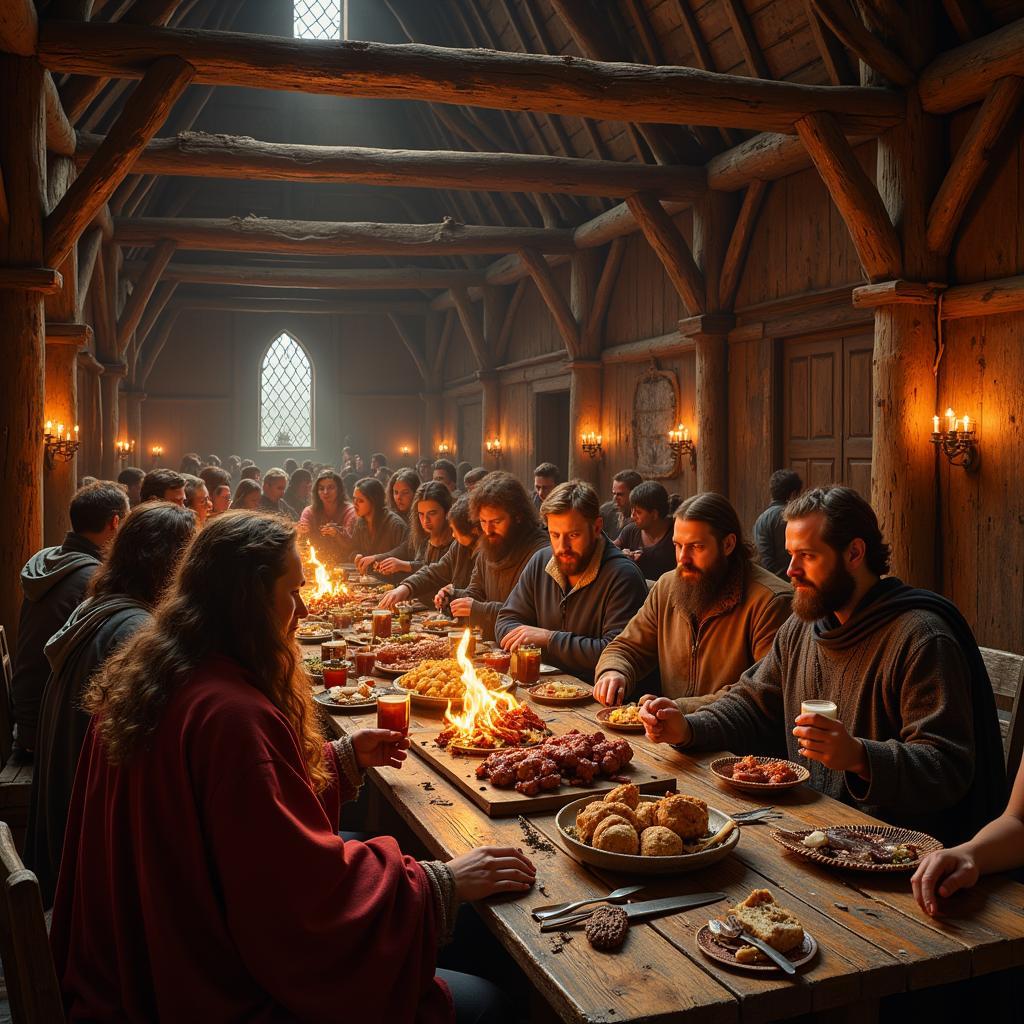The epic poem Beowulf doesn’t just tell a tale of monsters and heroism; it offers a glimpse into the intricate social fabric of early Germanic culture. Woven throughout the narrative are threads of generosity and hospitality, values held in high regard and deeply intertwined with honor, social standing, and even survival. From the grand mead-hall of Heorot to the humblest of dwellings, these concepts shape interactions, drive motivations, and ultimately influence the poem’s tragic arc.
The Importance of Gift-Giving: A Gesture Beyond Material Value
Generosity in Beowulf isn’t merely an act of kindness; it’s a complex system of obligation and reciprocity. Kings reward loyal warriors with treasure, ensuring their continued service and solidifying their own power.
 Beowulf receiving treasure from King Hrothgar
Beowulf receiving treasure from King Hrothgar
This exchange of gifts forges a bond of mutual responsibility. The giving and receiving of treasure, weapons, and even land underscores the interdependence between rulers and their thanes. Failing to uphold one’s end of this bargain – whether by being a stingy lord or a disloyal warrior – brought shame and diminished one’s reputation in the eyes of society.
Hospitality: More Than Just Open Doors
The concept of hospitality, intertwined with generosity, is paramount in Beowulf. Welcoming guests, even strangers, into one’s home and providing them with food, drink, and a place to rest was a sacred duty.
 Welcoming feast in Heorot
Welcoming feast in Heorot
Refusal to extend hospitality was a grave offense, reflecting poorly on the host and potentially leading to conflict. This act of welcoming, however, wasn’t without its inherent dangers, as Beowulf’s encounter with Grendel so vividly illustrates.
The Monster at the Feast: A Violation of Sacred Customs
Grendel’s attacks on Heorot are not merely acts of monstrous violence; they represent a profound violation of the sanctity of hospitality. By slaughtering Hrothgar’s men within the mead-hall, Grendel defiles a space meant for camaraderie and celebration, throwing the established social order into disarray.
 Grendel attacking Heorot
Grendel attacking Heorot
His actions are an affront to Hrothgar’s generosity and a stain on his reputation as a king. Beowulf’s arrival and subsequent defeat of Grendel aren’t just heroic feats; they are seen as restoring the balance of generosity and hospitality, reinforcing these crucial societal pillars.
The Tragic Irony of Beowulf’s Demise
Ironically, the values of generosity and hospitality, so deeply ingrained in Beowulf’s world, also contribute to his tragic downfall. As king of the Geats, Beowulf feels obligated to protect his people from the dragon, even in his old age. His act of selfless generosity ultimately costs him his life.
 Beowulf fighting the dragon
Beowulf fighting the dragon
The poem’s ending, while heroic, underscores the potentially double-edged nature of these values. While generosity and hospitality brought honor and stability, they could also demand ultimate sacrifice.
Conclusion: Enduring Values in a Harsh World
Generosity and hospitality in Beowulf are far more than simple social graces; they are the very foundations upon which society is built, shaping relationships, influencing actions, and ultimately determining fate. While the poem presents a world of harsh realities and constant threats, these enduring values offer a glimpse into the heart of early Germanic culture, where loyalty, honor, and the bonds forged over a shared meal held profound significance.